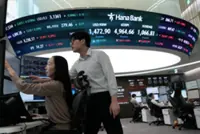JAKARTA (Reuters): Stocks in Taiwan logged another record high and South Korean shares were at their highest level since May 2022 on Friday as AI chipmaker Nvidia's results drove a global tech rally, while inflation in Singapore and Malaysia came in lower than expected.
Equities in Taiwan rose as much as 0.9%, while South Korean stocks gained as much as 1.2%, after Nvidia on Wednesday forecast a roughly three-fold jump in first-quarter revenue on strong demand for its AI chips.
Malaysian stocks were marginally higher after the country's consumer price index in January rose 1.5% from a year earlier, below the 1.6% growth forecast by economists in a Reuters poll.
A similar inflation trend was seen in Singapore where the key consumer price gauge rose 3.1% in January, lower than economists' forecasts but remained sticky amid slowing economic growth.
Singapore shares were 1.4% lower, dragged by a 10.2% drop in casino firm Genting Singapore after its quarterly results took a hit on higher-than-expected depreciation.
Inflation prints in Asian economies have shown easing trends, giving Asian central banks some breathing room, but the focus of investors remains on the timing of rate cuts.
Earlier this week, the central banks of Indonesia and South Korea left their policy rates unchanged.
However, "the recent run of stronger-than-anticipated data threatens to delay rate cuts in the U.S., which could impact Asian policymakers’ decisions," said analysts at ANZ in a note.
"The ability and willingness of Asian central banks to pivot ahead of the U.S. Fed will depend on their external positions and the domestic pressure for cuts," they added.
Currencies in the region were largely unchanged but headed for weekly declines. T
he Singapore dollar was flat and on track for its biggest weekly fall since the week of Dec. 29, 2023, while the Thai baht weakened 0.1% and was set to lose most in a week this month.
The Malaysian ringgit hovered near a record low level after reaching a 26-year-low on Tuesday.
The currency's plunge during the Asian financial crisis in 1998 led to then Prime Minister Mahathir Mohamad pegging the currency at 3.8 to the dollar, and the peg stayed until 2005.
The country's current Prime Minister, Anwar Ibrahim, said the currency's fall this week was concerning but a comprehensive view of the situation must be taken into account.
Key data releases for next week include mainland China’s February PMI, India’s fourth-quarter GDP and Hong Kong’s 2024-25 budget. - Reuters





